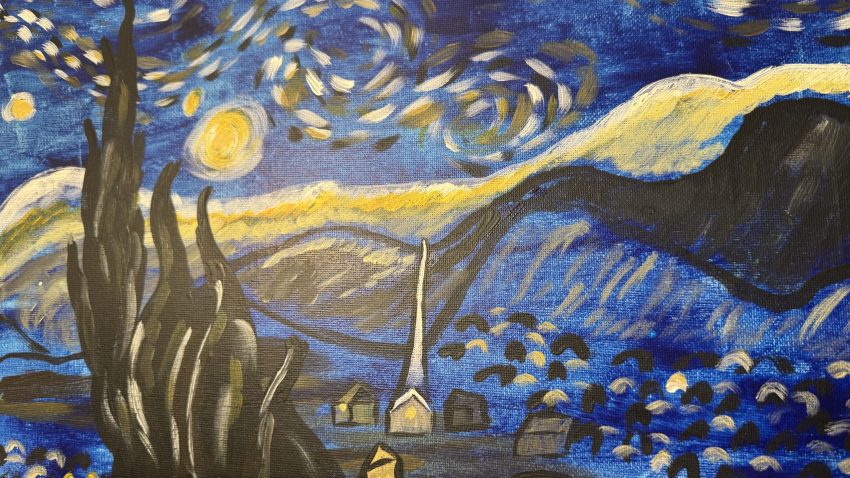Monday of the Second Week of Easter, April 28, 2025
(click here to listen to or read today’s scriptures)
Starry night
A few year ago Miles and Jasper spent the night with us while Andi and Aki made a couples retreat on their own in an AirBnB treehouse not far from Austin. They said they had a wonderful time, spending part of their two days painting versions of Van Gogh’s “Starry Night.” They gave us one of the canvases and we see it every day next to our Starry Night shower curtain. It is beautiful. They put their initials in the corner, barely visible.

Why did the heathen rage
and the peoples entertain folly?
The kings of the earth took their stand
and the princes gathered together
against the Lord and against his anointed.
Peter and John healed “everyone who saw them,” spent a night in jail and then stood up to the men who arrested them. “How can we NOT speak?” How can I not think of Van Gogh, who like Peter and John was unable to live a quiet life when God seemed to talk with him over and over. His father and grandfather were Dutch Reformed pastors, and Vincent began his own adulthood following them in those footsteps as a lay preacher in a mining region near Amsterdam.
As they prayed, the place where they were gathered shook,
and they were all filled with the Holy Spirit
and continued to speak the word of God with boldness.
Van Gogh chose to live among the miners and their families, sharing their poverty. Sometime along the way he was nicknamed the “Christ of the Coal Mine.” He painted and drew his friends the miners, “The Potato Eaters,” the families he lived with, but his contract with the church was not renewed because he failed to establish a community of worshippers.
On the advice of his brother Theo, Vincent began drawing and painting more and more. He believed he could serve God as an artist, and for the last ten years of his life that is what he did. He created more than two thousand paintings, watercolors, drawings and sketches, even though while he was alive no one except his family wanted anything to do with them. Always emotional, Vincent had trouble managing his disappointment, but with the help of his family he kept painting.
The wind blows where it wills,
and you can hear the sound it makes,
but you do not know where it comes from or where it goes;
so it is with everyone who is born of the Spirit.
As is true of many artists, Vincent often felt death as a companion of his depression. “Looking at the stars always makes me dream,” he said, “Why, I ask myself, shouldn’t the shining dots of the sky be as accessible as the black dots on the map of France? Just as we take the train to get to Tarascon or Rouen, we take death to reach a star.” Vincent would have appreciated the sad and angry Sabbath poem of Wendell Berry:
It is our own bodies that we give
to be broken,
our bodies existing before and after us
in clod and cloud, worm and tree,
that we, driving or driven, despise
in our greed to live, our haste
to die.
Leo Tolstoy once said that until he read the Gospels, he avoided holding ropes because he was tempted to hang himself. He saw no point in human life. That all changed for Tolstoy as he recognized new life in Jesus’ resurrection. That realization was neither as complete nor as stable for Vincent, who did indeed shoot himself and die two days later, when he was only 37.
Vincent noticed everything. He painted and drew it all, at times with great accuracy and at other more supernatural times, perhaps, with abandon. Those are his most famous paintings. But at the last I think of Mary Oliver’s poem. She too noticed everything. And she like Tolstoy felt her hope and joy restored, rather than reduced:
Who made the world?
Who made the swan, and the black bear?
Who made the grasshopper?
This grasshopper, I mean —
the one who has flung herself out of the grass,
the one who is eating sugar out of my hand,
who is moving her jaws back and forth instead of up and down —
who is gazing around with her enormous and complicated eyes.
Now she lifts her pale forearms and thoroughly washes her face.
Now she snaps her wings open, and floats away.
I don’t know exactly what a prayer is.
I do know how to pay attention, how to fall down
into the grass, how to kneel down in the grass,
how to be idle and blessed, how to stroll through the fields,
which is what I have been doing all day.
Tell me, what else should I have done?
Doesn’t everything die at last, and too soon?
Tell me, what is it you plan to do
with your one wild and precious life?
(Acts 4, Psalm 2, Colossians 3, John 3)
(posted at www.davesandel.net)
#